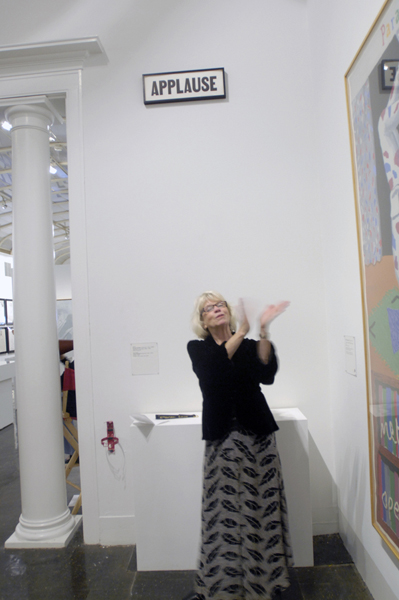
To Andy Burke, poetry is many things.
It is grabbing at smoke rings. It is heavy cream, while most conversation is skim milk. And if ordinary prose is beer, poetry is 90 proof whiskey.
“It dazzles the eyes,” Mr. Burke, who lives in Huntington Station, said of his art. “It tickles the brain.”
A soft, agreeing murmur rippled around the table of five fellow poets, who were meeting on Wednesday, March 28, in Cooper Hall next to the Rogers Memorial Library in Southampton for their weekly East End Poetry Workshop—a criticism-driven tradition going on nearly three decades.
“I think it’s the most intimate art because it’s just you in your head listening to your own heart and god,” Manorville-based poet Janice Bishop, one of the workshop founders, piped in. “It’s just profoundly intimate.”
Ms. Bishop is not the only one who thinks so. After all, April is National Poetry Month, and poetry aficionados across the country are now celebrating, each in his or her own way.
But not much changes for the occasion around the East End Poetry Workshop.
“Write,” Mr. Burke said.
“We write more poems,” added East Hampton resident Alex Russo, seated at the head of the table.
“I’m a total 7-day-a-week poet,” Huntington-based Greg Moglia, to Mr. Russo’s left, said. “I write,” he snapped his fingers, “boom, it comes.”
For poetry fans who aren’t moved to pick up a pen and paper, East End libraries and museums have other options covered. On Sunday, April 29, the Hampton Bays Public Library will hold an afternoon of poetry readings celebrating Long Island poets, including Anne Porter, Jackie Moss and current and former Suffolk County Poet Laureates Ed Stever and Tammy Nuzzo-Morgan, respectively.
Throughout the month, the Parrish Art Museum and Stony Brook Southampton are making poetry available to the masses by offering poems for cell phones and hosting spontaneous poetry happenings. Earlier this month, Stony Brook students wrote poems in response to the Parrish’s current exhibition, “EST-3: Southern California in New York—Los Angeles Art from the Beth Rudin DeWoody Collection,” which are now included in the museum’s free audio guide through June 17.
And on Saturday, April 14, the Parrish will celebrate and remember Ms. Porter with a reading of her poetry, a video interview from 2011 and Rudy Burckhardt’s madcap film, “A Day in the Life of a Cleaning Lady,” starring Larry Rivers and Anne and Fairfield Porter.
“Anne Porter was an important American poet, deeply tied to the East End creative community and the community-at-large, and we want to celebrate her legacy,” Curator of Programs Andrea Grover wrote in an email last week. “Once upon a time, committing poetry to heart was an important part of any liberal arts education. Thinking about poetry once a day for a month just might reignite this tradition. After all, ‘verse broadens the mind,’ the scientists find.”
In Bridgehampton, National Poetry Month doesn’t stop in April. On Saturday, May 19, the Hampton Library will host its third annual marathon reading of work by Emily Dickinson—the very woman who inspired Ms. Bishop’s journey into poetry.
“I started an interest in poetry and writing and reading when I was in the hospital a great deal as a child,” she explained. “And what is left but the imagination. My love of poetry began there, with a little book with some of Emily’s poems. And they were just so interesting and intriguing.”
Every poet’s start begins with a story, the poets agreed.
“I realized that my journey was connected with my divorce,” Mr. Moglia said. “I started going to poetry groups and you see, after 20 years, people coming in and starting off with something that they think is some little flowery-type poem. But then all of a sudden, week number three, somebody ran out on them or this relationship went kaput or there was a death of a child in the family. Terrible things. But they all come out.”
“It’s funny that you say that,” Springs-based Antje Katcher added. “I started writing when I was a teenager, but in German. The way I started going back into it was I sat down at my typewriter and said, ‘I couldn’t believe what he’d done this time!’”
She paused for dramatic effect as her fellow poets burst into laughter.
“That was about three years before my divorce,” she concluded with a chuckle.
“Well, there it is,” Mr. Moglia said. “And when people finish a poem that hits, you’ll hear the emotional, ‘Ahh.’ If a person sits back and says, ‘Well, that was a really well-done poem,’ no, something’s off. It’s usually this initial, emotional reaction. That’s what poetry does.”
“That’s why I’m shouting out when I should be quiet,” Ms. Bishop said.
According to Mr. Russo, poetry is so powerful because it’s a condensation of experience, emotion and feeling.
“It’s always very meaningful to the poet, otherwise he or she wouldn’t bother to put it down,” he said.
“There’s something visceral about it,” Keven Bridge of Southampton added. “It’s more like a dream state.”
When asked what advice they would give to budding poets, several workshoppers replied simultaneously, “Just write.” Read a lot of poetry, they said, and read it out loud. Their suggestions run the gamut, from American best-sellers Billy Collins and Mary Oliver to rap lyrics and the Bible.
And don’t forget to join a poetry group.
“We’re always hungry for beginners,” Mr. Russo said. “So we’ll see you next week!” Mr. Moglia said.
“We’ve seen people come here to start, and have grown,” Ms. Katcher added.
“That’s what you expect,” Mr. Russo said. “That’s what you hope.”